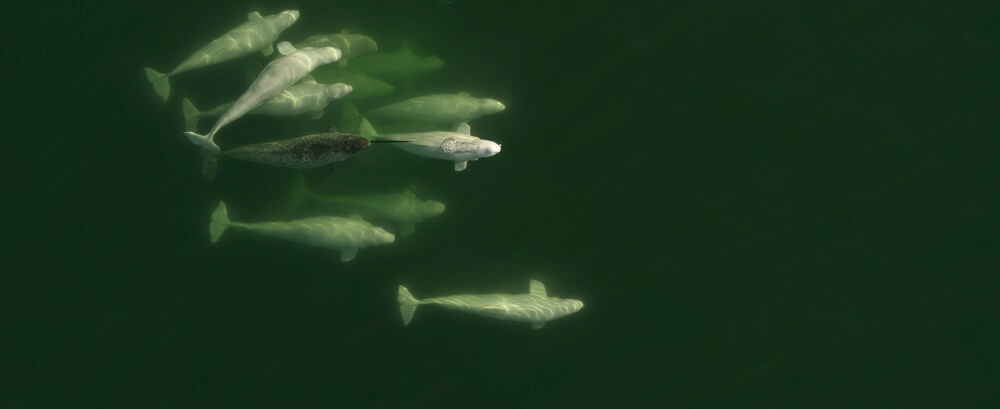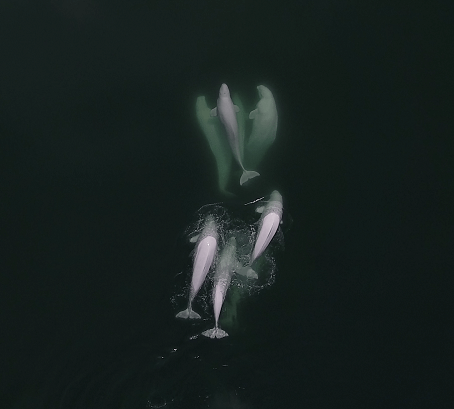On Monday, November 15, 2021 at 2:30 p.m., a press conference was held in Cacouna to announce the Government of Quebec’s financial support for the Window on Belugas project. Quebec ministers Pierre Dufour (Forests, Wildlife and Parks) and Caroline Proulx (Tourism) announced a grant in the amount of $600,000 to GREMM to carry out this scientific and educational project dedicated to the St. Lawrence beluga. Read the Government of Quebec’s press release here.
Window on Belugas: A Scientific and Immersive Adventure with Belugas
Thanks to the combined use of light drones and hydrophones, it is now possible for researchers to observe, listen to, follow, and even take measurements of whales without approaching or disturbing them in order to gain a new perspective on the social life of belugas, whose longevity is comparable to ours. Window on Belugas will therefore allow us to maintain these research projects but also to allow the general public to discover the visual and sound universe of belugas, live or recorded, by participating in educational activities at three land-based observation sites and in the future immersive room of the Marine Mammal Interpretation Center.
A scientific adventure that aims to promote a better understanding of belugas so that we might better protect them! Our efforts to protect belugas must be guided by a detailed knowledge of their habits and needs. From three land-based sites and one mobile site, researchers from the beluga Brigade will use hydrophones and drones to collect valuable data on the presence and behaviour of belugas and the impact of human activities in these high-residence areas.
An alternative to whale watching at sea under development on either shore of the St. Lawrence! As part of the Saguenay-St. Lawrence Marine Park network, Window on Belugas aims to reduce recreational boating traffic in the most sensitive parts of the beluga’s critical habitat. Interactive activities will therefore be offered to visitors from three land-based observation sites: Pointe Noire (Parks Canada site), Baie Sainte-Marguerite (Sépaq site) and Gros Cacouna (Wolastoqiyik Wahsipekuk First Nation site). Visitors will then be able to get a feel for what it’s like to be a scientist and observe in real or delayed time the aerial images and underwater sounds recorded at the sites by the drones and hydrophones of the “Beluga Brigade.” An excellent opportunity to learn more about beluga behaviour.
An immersive theatre that promises to offer a larger-than-life experience with belugas! In summer 2022, the Marine Mammal Interpretation Centre will inaugurate its new immersion room, which is set to replace its current projection room. Acting like a sort of control center, the immersion room will house a digital laboratory for the Window on Belugas project. The public will then enjoy an unparalleled opportunity to enter into the fascinating universe of this endangered species, whether in real time or deferred. The activity will be led by naturalists and will allow visitors to observe research work carried out in the field and interact with researchers.
A collaborative project
Window on Belugas is a collaborative project led by the Group for Research and Education on Marine Mammals (GREMM), the Marine Mammal Observation Network (MMON) and Ocean Wise. It will be implemented in partnership with Sépaq and Parks Canada in the Saguenay-St. Lawrence Marine Park on the north shore and with the Wolastoqiyik Wahsipekuk First Nation at Mt. Gros-Cacouna on the south shore.
Major financial support
In addition to the assistance from the Quebec government, the Window on Belugas project was made possible by an investment of $1.1M from Fisheries and Oceans Canada through the Canadian Nature Fund for Aquatic Species at Risk (CNFSAR). Assistance from the Grand Mouvement Fund and the Fonds d’aide au développement du milieu de la caisse Desjardins was also granted for the development of the Marine Mammal Interpretation Center’s immersive room.
The survival of belugas and the protection of their habitat are contingent on the value that we place on them. A better understanding of them and increased awareness of their fascinating universe are the best guarantees for their future.






